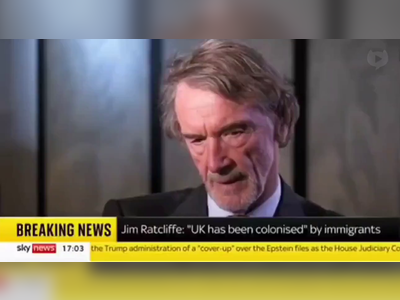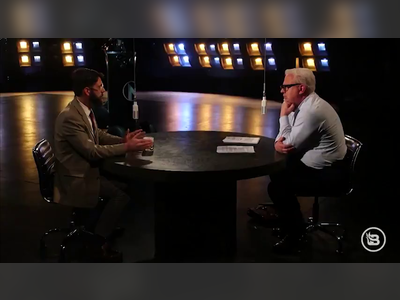
The Pandemic Disaster That Might Not Matter
Britain has passed the grimmest of milestones: 100,000 people dead from COVID-19. This appalling tally is higher than anywhere else in Europe, and almost twice that of Germany, the biggest country on the continent. By one measure, Britain is now the worst-hit G-7 nation relative to its size.
There is simply no escaping the reality that the country has suffered a catastrophic failure of governance. On March 17, six days before Boris Johnson ordered Britain’s first full national lockdown, his chief scientific adviser, Patrick Vallance, told members of Parliament that, based on modeling provided to the government, a “good” outcome over the course of the pandemic would be if deaths were kept below 20,000.
And yet, Britain has also shown wisdom. Although its vaccination program remains in its early stages, it has raced ahead of every other country in Europe, having bought more doses, sanctioned their use more quickly, and begun their rollout with more urgency. Even as Britain’s death tally eclipses 100,000, more than 6.5 million vaccinations have been administered, far more than Germany or France. This has been helped by the Oxford AstraZeneca vaccine, the most cost-effective and easiest to use of the inoculations approved so far, which was developed in Britain in part because of early and heavy government backing. If the country’s record in saving lives has been one of abject failure, its vaccination record is anything but.
This stark contrast makes the job of judging Britain’s overall performance complicated. How much weight should we give to speed of recovery over the extent of the ongoing calamity? How can we disentangle one from the other? Should we? Where must we allocate blame and credit, and in what proportion?
These questions cannot be answered objectively. They will become the subject of daily talk-radio phone-ins, academic studies, and sweeping first attempts at historical narratives. They will also become part of the daily muscle fiber of British politics, exercised in Parliament and in the media, subject to claims and counterclaims, lies and obfuscation, half-truths, supposition, and unprovable counterfactuals.
Crucially, this battle will not be one between teams of political archaeologists digging for the truth, but between storytellers fighting to define the national myth of what happened. For this reason, Johnson’s opponents have cause for concern, no matter how solid their case against him appears. Johnson—whatever you think of him—is a master politician who has spent a career defying the usual rules of political gravity, avoiding blame for his failures, claiming credit for others’ victories, being forgiven for errors of judgment that might have been career-ending for another leader, all while growing in power and stature. And this time, he has some striking counterintuitive advantages.
Daniel Kahneman, the Israeli Nobel Prize winner, has talked about the “cognitive trap” of confusing experience and memory. What we experience in life isn’t what we remember. Instead, we form a story of what happened, to make sense of events. “There is an experiencing self, who lives in the present and knows the present,” Kahneman explains. “Then there is a remembering self, and the remembering self is the one that keeps score.” Kahneman describes this remembering self as the storyteller, choosing the experiences we have been through, editing them down, and fitting them into a narrative that makes sense. What define these stories, Kahneman says, are big changes that happen, significant moments in our lives, and endings. “Endings,” he notes, “are very, very important.”
Every country offers supporting evidence for Kahneman’s thesis, picking bits of its national experiences to form its historical narrative. In the United States, for example, the battle rages between two accounts: one of the land of the free born in 1776, of men created equal and endowed with unalienable rights; the other of a country that emerged a century and a half earlier, in 1619—a land of apartheid and slavery. A similar tension can be seen in France, which holds itself up as a nation of liberté and égalité, but spends less time thinking of revolutionary terror, Algeria’s colonization, or the many citizens who feel neither free nor equal today. In Britain, too, we are master storytellers: an island nation that ruled the waves, and the plucky underdog who defied the odds to prevail against mightier foes. We are the battle-hardened warriors of Agincourt, not the losers of the 100 Years War; the civilized rulers of empire, in comparison with the ghastly Belgian or German butchers. At our core, we see ourselves as an ancient oak of liberty and law and constitutionalism and moderation, not as the country of peasants’ revolts, regicide, and aristocratic privilege.
But they are all stories, not accounts of actual experience. The events we choose to remember are the ones that tell the story we want to hear, those that reflect the values we hold today and the country we hope to be: the Magna Carta and Henry VIII, two world wars and one World Cup. The terrible losses that dominated most of Britain’s Second World War story are overwhelmed by the moments of glory that followed. We largely remember 1944–45, not 1939–44.
Kahneman tells the story of an audience member at a question-and-answer session who complained that he had listened to a symphony for 20 glorious minutes only to have the whole experience ruined by a horrible screeching sound at the end. Johnson is betting that the opposite is true today, that he can define the story of Britain’s pandemic based on the memory of its ending, not the bulk of its experience.
And he might be right.
In November 2007, Johnson released a children’s book called The Perils of Pushy Parents, which he had written and illustrated. The “cautionary tale,” as its front cover describes it, tells the story of the Albacore family, whose parents come close to a tragicomic death, plunging off a cliff after relentlessly haranguing their children to turn off the television and succeed in life. Just as they plummet over the edge, the pair suddenly snap out of it:
Like some bounding antelope
The wheelchair-jockeys clear the slope,
And in that instant something stirs
Inside their heads. A sprocket whirs.
Their brains switch on, their eyes demist,
They realise that they still exist.
At this moment, a hand shoots out from on the heath to catch them before they hit the rocks. So goes Johnson’s first and, thus far, only children’s book, a tale of close calls, happy endings, and libertarian wisdom. This is a picture of the parent Johnson wants to be—the opponent of pushiness and authority, the individualist. Let the kids watch TV, Johnson advises. Let them be.
This is also the leader Johnson supposes himself to be, and the leader many of his Conservative MPs raging against his successive lockdowns want him to be. One narrative of Britain’s pandemic response that has taken hold is that this kind of mild libertarianism is a key reason the country has performed so badly. At each turn, Johnson has resisted taking control until the escalating death toll left him no other choice.
In this and other ways, the pandemic revealed Johnson’s governing instincts, and some of his principal weaknesses. In 2020, Britain faced two waves of infection. During the first, in March, he clung close to his scientific advisers, who advised against locking down too hard or too soon, fearing that the crisis could last years before a vaccine was available and that a shutdown would lead only to bigger subsequent outbreaks. Johnson accepted this advice until the political climate changed as other countries imposed shutdowns and academic models showed that without action, deaths could run into the many hundreds of thousands. Although Britain obviously failed relative to other places in the first wave of the crisis, this earlier period was a collective failure of the British state, including Johnson.
The second wave, which began to crest in December, is a different story. Johnson once again resisted stricter measures taken elsewhere to suppress the virus, but this time he did so against the advice of his experts, who, from October on, were pushing for more draconian rules. Johnson’s alibi here is that his judgment was sound, but he got unlucky because a much more transmissible variant of the virus suddenly appeared. This is both true and misleading; it omits the reality that he was resisting stricter measures to control the virus even after the new variant’s discovery.
One Johnson ally who knows him well told me that the prime minister likes to leave decisions until as late as possible, which is often an advantage in politics. Brexit is a prime example of this: In securing both a revised withdrawal agreement to leave the European Union and a trade deal to set the future economic relationship between the two sides, Johnson repeatedly sailed close to the wind, risking “no deal” calamities while threatening to break international law to secure concessions and public support. However, in a pandemic, this is the worst way of governing possible. As a decision is delayed, better choices are removed, leaving only bad options. “It’s deeply frustrating,” said the Johnson ally, who declined to be identified discussing the prime minister’s private deliberations.
Rory Stewart, the former international-development secretary who challenged Johnson for the Conservative leadership in 2019—and was later expelled from the party by Johnson—shares this assessment. He told me that the prime minister had flip-flopped throughout the crisis, never sure what he was principally trying to achieve and ending up with the worst of all worlds as a result. “From the beginning, he has lacked the two most important traits you need in a crisis: urgency and the ability to communicate clearly and consistently,” he said.
“Boris has a habit of procrastinating until something good turns up,” Stewart said. “Even in December, Boris was not quite sure whether the priority was to reduce the number of excess deaths or whether he had loyalties to the libertarian right of his party.” Johnson’s struggle reflects Britain’s wider problem during the pandemic. Was its strategy to save as many lives as possible, or to protect ordinary life without overwhelming the health service? Or was it just to muddle through?
Still, everyone I spoke with noted Johnson’s extraordinary resilience and capacity to reinvent himself. Despite Britain’s disastrous coronavirus record, Johnson remains level in the polls with the Labour opposition, and an election is not due until 2024. Now, in the new phase of the crisis, in which the government is seeking to restore people’s liberties, Johnson is on his home turf. “Boris articulates his role in life as being the captain of the rugby team,” Stewart told me. “He likes to find issues where he can give the positive pre-match pep talk.”
In a sense, all politicians try to form a narrative of events that suits them. The debate, as Stewart noted to me, is usually about where the story ends. “You want it to be at the point things were good,” he said. “Your opponents want it to be at the point it was bad. Boris has been very good at winning these debates.”
By the summer, Britain may have a good story to tell: of a country that came together in its hour of crisis to vaccinate the elderly and the vulnerable before almost any other country, using British-made medicines, delivered by its greatest institution, the National Health Service. The disaster of 2020 was an aberration, a once-in-a-lifetime event that overwhelmed the world, not just Britain, to be followed quickly by the country’s salvation—an exhibition of national vitality embodied by the prime minister who literally almost died before fighting back himself.
The story does not have to be entirely true to be powerful. It just has to have enough truth to not be absurd and, regardless, is a nicer story to believe than the one in which the country failed miserably, not once but twice. At the end of Life of Pi, Yann Martel’s novel about a boy who is trapped on a boat with a tiger, disbelieving investigators force the protagonist to tell them what really happened. He then recounts a horrible story of cannibalism and amorality that he somehow survived, but challenges the skeptics as to why they don’t believe his original account. “Which is the better story?” he asks.
Johnson’s success or otherwise in winning the narrative battle of Britain’s pandemic experience has implications that go beyond his own future as prime minister—the fight to define the story of the pandemic is global as well as British.
For much of the past few years, following Britain’s vote to leave the European Union, the political crisis in London has worked to undermine other euroskeptic movements across the continent. The once-feared contagion effect of Brexit has sunk from view as the EU has out-negotiated and outperformed the U.K. Britain’s failures during the pandemic only added grist to the mill of those warning against “populism”; commentators from across the continent and the United States have compared Johnson to nationalists such as Donald Trump and Brazil’s Jair Bolsonaro.
The danger of these attacks is that, first, Johnson is not Trump, in being neither authoritarian nor even particularly anti-establishment, and, second, they risk being exposed should Britain’s relative performance change for the better. In France, there is real concern among those at the very top of government, according to analysts I spoke with, about the febrile political situation facing President Emmanuel Macron before his reelection campaign next year. The country’s pandemic response has been middling-to-poor—though nowhere near as bad as Britain’s in raw death count—but France is one of the worst-performing countries in terms of its vaccine rollout. Just as Johnson must battle to define the pandemic story at home, Macron faces his own fight. Should Britain, or any other European country, be free of COVID-19 restrictions months before France, the French story may quickly change.
Already, Johnson and his government have sought to present Britain’s vaccine-rollout success as a benefit of Brexit (even though they would have been legally free to do exactly as they have done within the EU). If he is able to make good on the country’s early successes—and that remains a big if—it will not only give him cover for the failures of 2020, but provide a victory to drive the other story of his premiership, that Brexit has been a success and Britain can make it on its own.
Johnson is showing the fleetness of foot that has led some of his more strident critics abroad to label him a “shapeshifting creep.” He has moved Britain from its position as the most pro-China major state in Europe to the most hawkish, offered a route to citizenship for millions of Hong Kong citizens, imposed sanctions on Belarus before the EU, and quickly congratulated Joe Biden on his victory while Trump continued to challenge the result. He is attempting to shift Britain’s international story as well as its domestic one.
Jonathan Powell, Tony Blair’s former chief of staff, agrees that this rule, that crises are remembered for their end rather than how they were experienced, has often held. However, Powell warns that voters tend to vote for parties or leaders based not on what they have done, but on what they will do next. “If he runs as the man who solved the coronavirus, he might have trouble,” Powell told me. Stewart agreed. “He can create a narrative to pull things back for him, but he will be subconsciously weakened.” Yet Johnson doesn’t need to win the debate; he needs only to have a narrative of success to build into the story he will eventually sell at the next election.
For Britain, like all countries emerging from this crisis, the challenge is whether the story that is eventually believed serves to improve the country or to cover up its failings. Regardless of Johnson’s success or otherwise in his role as national team captain, cheering it on and convincing it of its triumph and potential, overseeing a genuinely impressive early vaccine rollout, there is little doubt that 2020 exposed catastrophic weaknesses in the state and its political leadership that has left more than 100,000 people dead. That cannot be wished away.











